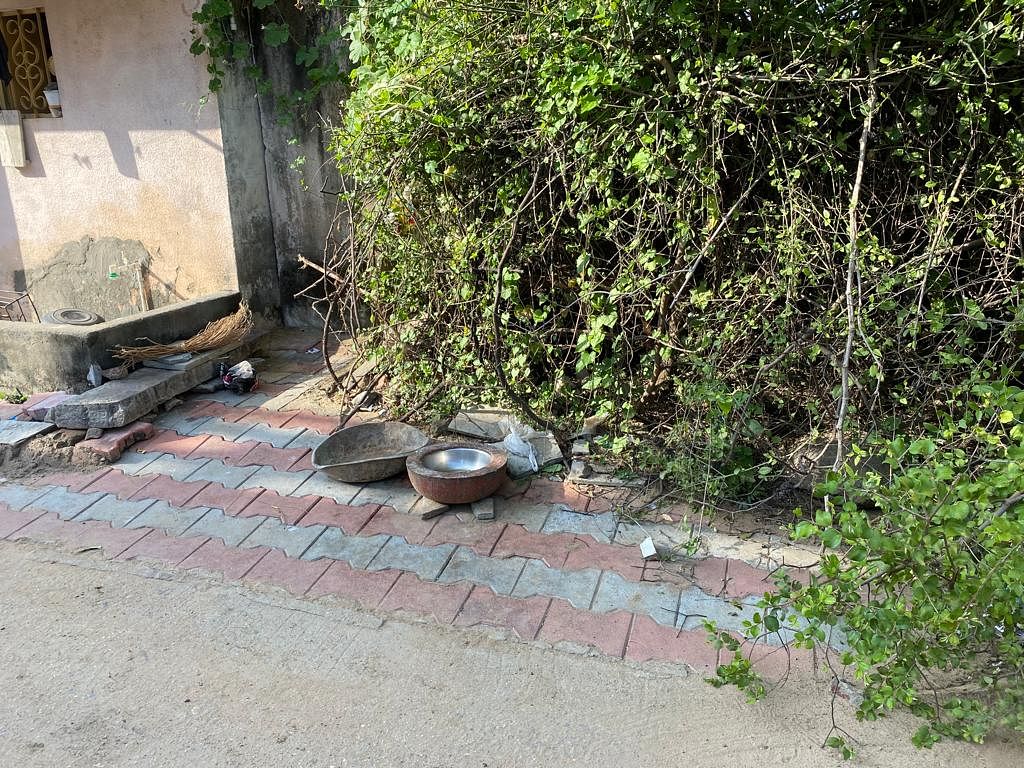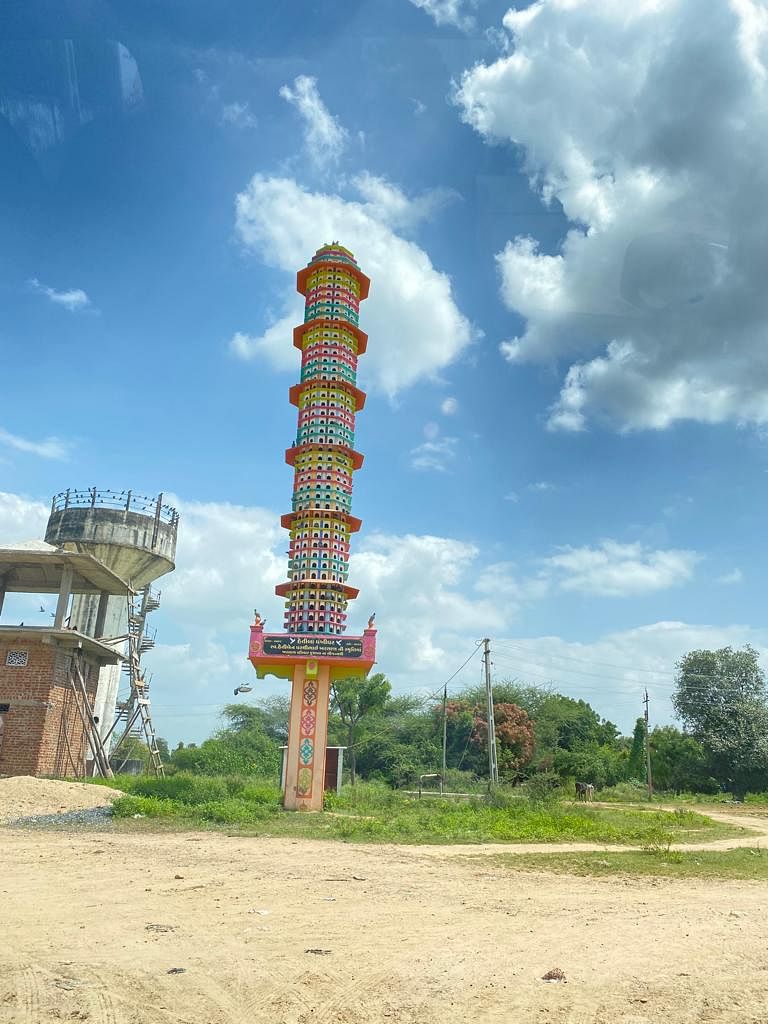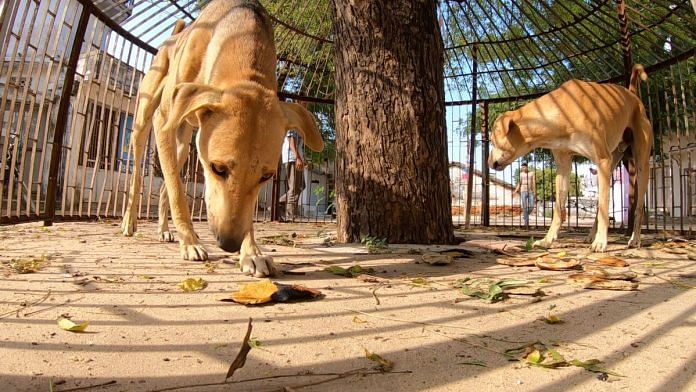The dogs have it good at this Gujarat village called Kushkal. And a Mughal nawab was responsible for it. The canines in Banaskantha district own land, don’t struggle for food and are served hand and foot by villagers. They are the dog millionaires of Gujarat. For villagers, serving these animals is a call of duty passed down from generation to generation.
There are as many as 200 dogs in Kushkal. Howls, barks, yips and yelps have become background noise for the villagers much like the thrum of construction activity in a big city. But when you own 26 bighas of land worth at least Rs 2.5 crore, such behaviour is allowed.
The dogs run in smaller packs or “gangs” of five to six. “He’s part of the Kalu gang,” says 14-year-old Kinjal, as she strokes a black stray who eagerly soaks up the affection. She has learned to take care of the dogs by watching her parents and village elders.
“No dog sleeps hungry in this village,” says 75-year-old Jeetabhai Kalubhai Lauh as he relaxes on a pink pillow on a cot on the veranda of his pucca house. Outside, a dog lolls in the heat. “We saw our parents and grandparents take care of the dogs when we were children, and now we are doing the same. We feed them khichdi, roti and things made from milk,” he adds. In this rather unusual village, it’s the land owned by the dogs that draws attention, as much as the villagers’ devotion to them.
Also read: Every dog has its day, except in Delhi NCR. Parks are shut, RWAs are angry
Landowner dogs of Kushkal
The 200-odd dogs collectively own 26 bighas of land adjoining the road outside the village. The land is registered in the name of ‘Samast Gaon Kutrani’ committee, which oversees the welfare of the dogs.
The 12 committee members see themselves as guardians of the land, not the owners. They take decisions on the feeding of the animals and cultivating the land. “We can say that dogs of our village are millionaires,” says Jeetabhai, breaking into a grin.
According to the villagers, the dogs’ right to the land goes back at least 250-300 years. “In the Mughal era, villagers did not have resources to feed the dogs so they approached the nawab, Talib Mohammad Khan, for help,” says 80-year-old Ramesh Patel, sitting in the courtyard of his house. As a solution, the nawab gave them a piece of land to house the dogs.
A dog enters the courtyard. It doesn’t skulk or cringe but walks with the confidence of an animal that knows it’s always welcome.
Over the years, the property has gained in value, more so after a bypass road was built near the village. The dogs have access to the land, but they mostly stay in the village.
“No one can even think of misusing this land. It would be a sin to do so and everyone here has the fear of God,” says village sarpanch Ramesh Bhagat, sipping on tea in the panchayat office.
But the local administration has no such fear as they tried to buy the land. “Twenty years ago, a collector here called us about the land. They wanted it, but we flatly refused [their offer] because this land is for religious work, for dogs. Why would we give it to the government?” asked Patel.
He gets annoyed when people try to put a price on the land. But the winds of change are blowing through this dry and dusty village.
Also read: Mata ni pachedi art was Gujaratis’ way to fight temple ban. Now big task is to keep it alive
Borewells for better caregiving
The villagers are practical and the land is not wasted. Every year, farmers bid to cultivate it. The highest bidder gets permission to grow crops, and the money goes to a trust set up for the welfare of the dogs in Kushkal.
Bound to the vagaries of the monsoon, a bountiful harvest is not a guarantee in the village. It’s common for crops to fail because the farmers are solely dependent on rainfall. “There is a water problem in the village and many times farmers do not even recover the cost. But in tough times, everyone comes together to help,” says Jitendrabhai, a resident of the village.
Ramesh Bhagat is drawing up plans to install borewells so that the land can be cultivated at least three times a year. “We can use the money from the cop to make shelters for the dogs and the rest to buy fodder for cows. Right now, the land is not being fully utilised. For borewells, money will be provided by the committee,” says Ramesh Bhagat, the village’s sarpanch.
Duty of women folk
The dogs are blissfully unaware of the village’s plans. As the sun starts to dip, a few make their way to a raised platform at the village crossroads. The animals feast here in large cages. Preparing meals for the dogs is an intrinsic part of village life. Every day, a household in the village makes five kilograms of millet or wheat flour rotis and then goes to feed the dogs.
The ‘duty’ falls on the women. Sushila Behn takes two hours to prepare the rotlas (thick rotis) on the clay stove. She bought the ingredients from the common fund.
She has to forego her afternoon nap for this, but she isn’t complaining. First, she lights the stove and then prepares the dough in a big pot.
“This is holy work. I have no problem doing it,” she says.
It’s a novel experience for new residents, most of whom are young brides. They, too, learn to accept and adapt to this daily ritual “that goes back for generations.”

“When I came here after getting married, I was a little surprised, but gradually I also fell in love with all this. Earlier my mother-in-law used to make rotis. Now, I cook and feed them when it’s our turn,” says Usha.
There’s a small store in front of the feeding platform that stocks small grocery items. “Whenever someone gets good news, they come to celebrate here by feeding the dogs. Sometimes people buy biscuits from stores and feed them.” Usha adds.
Dinner, which is always vegetarian, is served to the dogs at around 5 pm. Some dogs ignore the platform filled with trays of food as they have had their fill. Many families keep small bowls of food and water for their guests.
During festivals, dog food is prepared on the temple grounds by the committee. Khichdi, halwa and some milk items are some of the special items on the menu.

Love for animals runs deep in Kushkal. Even the birds are under the care of villagers who have built a birdhouse at the entry gate. They’ve painted it bright yellow and pink. Pigeons and sparrows have made it their home, but villagers say it’s not enough. They are constructing a small structure where the birds can feed on grains.
Also read: ‘Moditva’, wooing tribals, scarce mention of CM: What BJP strategy in Gujarat yatra was all about
Cause for concern
The lack of healthcare facilities is a cause for concern as the nearest veterinary doctor is 13 km away in Palanpur city. “If any dog gets injured, we put on a bandage and perform first aid. There is no need for a clinic,” says Abhishek, another resident. The dogs are neither sterilised nor vaccinated, and animal welfare activists are pushing for more measures to be taken.
“Anti-Rabies Vaccination is must for dogs and It helps in minimising the chances of Rabies in humans in case of dog bites. In this case If the dogs are not vaccinated. It is a big health risk. The foundation looking after the dogs can seek the help of government in providing vaccination. They can also take help of local NGOs and trained professionals in vaccination of dogs.” says Dr Ramesh N Ilasariya, based in Palanpur near Kushkal village.
For the children, their parents and their grandparents, the dogs are family. “We know how many dogs are in which neighbourhood and who has produced how many children. Often, we play with the little puppies and take special care of their needs,” says Kinjal.
As dusk settles in the village, children stop playing with their favourite dogs and puppies and return home for dinner. Some of the older dog gangs start to stir. They will patrol the lanes and guard the houses. No stranger will enter Kushkal unnoticed.
(Edited by Ratan Priya)



